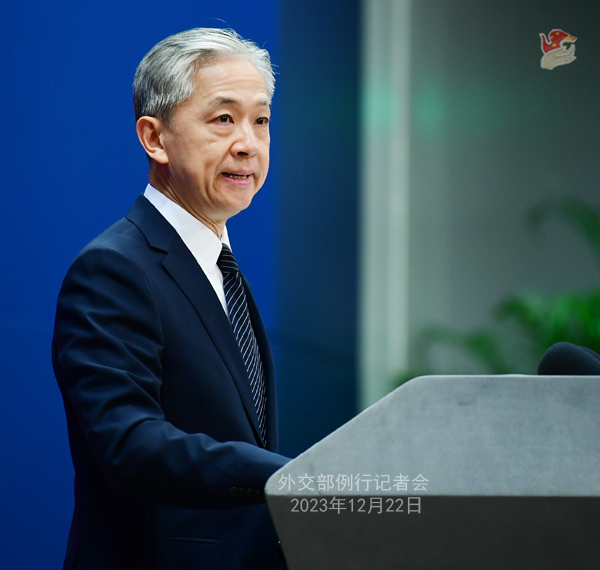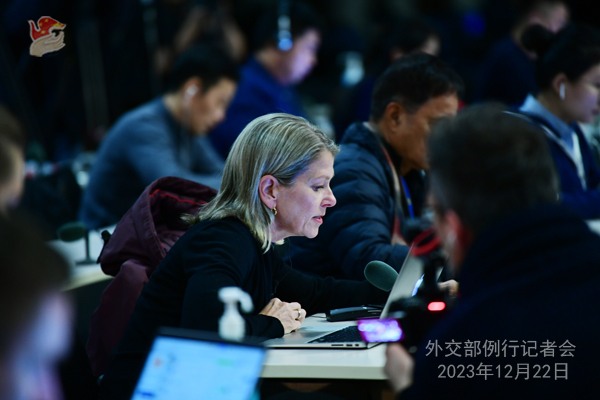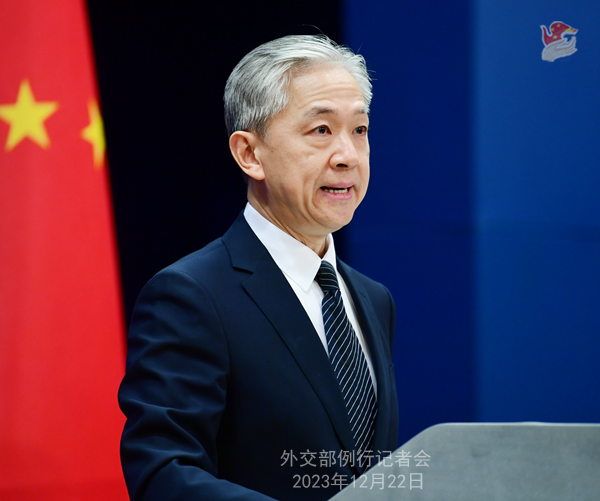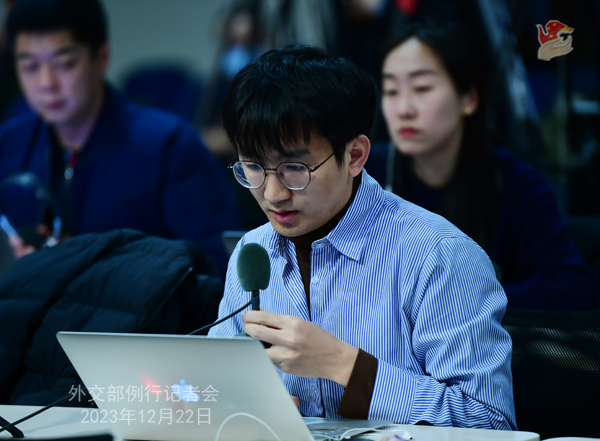| Foreign Ministry Spokesperson Wang Wenbin’s Regular Press Conference on December 22, 2023 |
| 2023-12-22 21:17 |
|
The fourth Lancang-Mekong Cooperation (LMC) Leaders’ Meeting will be held via videolink on December 25. Premier Li Qiang of the State Council and the leaders of the five Mekong countries, namely Cambodia, Laos, Myanmar, Thailand, and Viet Nam will attend the meeting. CCTV: Premier Li Qiang will attend the fourth Lancang-Mekong Cooperation (LMC) Leaders’ Meeting on December 25. How does China view the current development of the Lancang-Mekong Cooperation? What’s China’s expectation for this meeting? Wang Wenbin: The Lancang-Mekong Cooperation (LMC) is the first new sub-regional cooperation mechanism focused on building a community with a shared future with wide consultation, joint contribution and shared benefits of the six Lancang-Mekong countries. In the past seven years since its inception, LMC enjoyed rapid development and put in place an LMC framework guided by leaders and underpinned by all-round cooperation and broad participation. With progress and results delivered daily, monthly and annually, we have created an LMC speed, and fostered an LMC culture featuring equality, sincerity, mutual assistance and kinship. LMC has become a stellar example for countries to develop relations with each other, conduct regional cooperation and pursue South-South cooperation. Lancang-Mekong countries are at an important stage of speeding up development and achieving modernization. At the eighth LMC Foreign Ministers’ Meeting held earlier this month, parties focused on regional stability and prosperity, highlighted the growth of new development advantages in the region and made full preparation for the upcoming Leaders’ Meeting. We hope that the upcoming Leaders’ Meeting will advocate building a Lancang-Mekong community with a shared future, focus on cooperation in such areas as integrated development, environmental protection, technological innovation, security governance and people-to-people exchanges, have in-depth discussion on advancing the Lancang-Mekong Cooperation Economic Development Belt, and contribute to regional countries’ common development and modernization. NBC: It’s reported that Chinese leader said China will reunify Taiwan with the mainland. While this is a known policy position, does this raising of the Taiwan issue in such a direct manner at the highest level with the United States imply that there is a change in China’s tone or determination on the Taiwan issue, in particular ahead of Taiwan election? Wang Wenbin: During his meeting with President Biden in San Francisco this November, President Xi Jinping outlined China’s principled position on the Taiwan question. The readout of the meeting was released soon after their discussion. President Xi pointed out that the Taiwan question remains the most important and most sensitive issue in China-US relations. China takes seriously the positive statements made by the United States in the Bali meeting, and the US should match its action with its commitment of not supporting “Taiwan independence”, stop arming Taiwan and support China’s peaceful reunification. It needs to be pointed out that resolving the Taiwan question and realizing the complete reunification of the motherland is the common aspiration of all sons and daughters of the Chinese nation. Our position of advancing reunification is consistent, rock-solid and unshakable. China will realize reunification, and this is unstoppable. China Daily: During the summit meeting in San Francisco, China and the United States agreed to establish a working group on counternarcotics cooperation and carry out counternarcotics cooperation. What specific measures has China taken so far? Wang Wenbin: Carrying out counternarcotics cooperation is one of the important common understandings reached between the two Presidents during their meeting in San Francisco. To deliver on that, the US side has lifted sanctions on relevant Chinese law enforcement institute. Recently, China has been engaged in campaigns against fentanyl and its precursor chemicals, and cracked down on illegal and criminal activities involving the smuggling, illicit manufacturing, trafficking and abuse of fentanyl-related substances. We have carried out a sweeping inspection of key businesses, personnel and equipment. We have been working to clean up information about online sales of fentanyl, and strictly prevent the smuggling and trafficking of relevant chemical substances to protect people’s physical and mental health. The counternarcotics authorities of China and the US are resuming regular communication. The Chinese side has notified the US side of the progress made in US-related law enforcement operations against narcotics. China has responded to US request for verifying clues on certain cases and taken action. The two sides are in close communication on setting up a working group on counternarcotics cooperation. I need to stress that progress in resuming China-US counternarcotics cooperation has not come easy and needs to be doubly cherished by both sides. We hope that the US side will show sincerity, work with China in the same direction and continue to carry out practical counternarcotics cooperation based on mutual respect, equality and mutual benefit.
Al Jazeera: Lately, the Israeli authorities have been confiscating occupied territories in the name of urban development, especially the Palestinian-owned land in East Jerusalem. Such practice violates international law and has become a fuse directly causing the escalation of the Palestinian-Israeli conflict, which undermines peace and sabotages the possibility of the two-state solution. What is China’s position on Israel’s acts? As a permanent member of the UN Security Council, what measures can China take to stop these acts of Israel which violate international law? Wang Wenbin: China opposes Israel building settlements on the occupied Palestinian territory. China opposes unilateral change to Jerusalem’s status and status quo shaped by history. We believe that the issue of Jerusalem’s status should be settled through negotiations by parties concerned in accordance with relevant UN resolutions. As Palestinian-Israeli tensions continue to escalate and risk of spillover of the conflict in Gaza heightens, relevant parties need to be prudent and avoid any move that might lead to escalation or get the situation to spiral out of control. Reuters: Angola is the second largest exporter of crude oil in Africa. It announced yesterday that it would exit from OPEC. Since 2010, Angola has been a reliable strategic partner of China. Is there any negative impact of the exit from OPEC on the trade relationship between China and Angola? Wang Wenbin: China is committed to practical cooperation with Angola in various fields on the basis of equality and mutual benefit. CCTV: President Xi Jinping had a recent phone call with President of Nicaragua Daniel Ortega ahead of the second anniversary of the resumption of diplomatic relations. The two heads of state announced the establishment of strategic partnership between the two countries. This marks a capstone of China’s effort this year to enhance friendship with Latin American countries. Can you share more details of China’s cooperation with Nicaragua and with Latin American countries? Wang Wenbin: President Xi Jinping and President Ortega jointly announced the establishment of strategic partnership between China and Nicaragua. This is a milestone event in the history of China-Nicaragua relations. It serves the common interests of the two countries and the two peoples, and promotes the common development and prosperity of the two countries. Over the past two years since diplomatic ties were resumed, the two countries, guided by head-of-state diplomacy, have steered bilateral relations in the right direction, cemented political mutual trust, increased strategic coordination and accelerated practical cooperation. Both countries have benefited from resuming diplomatic ties. The resumption and growth of relations with Nicaragua is an epitome of how China has deepened ties with Latin American and Caribbean countries in recent years. Costa Rica, Panama, the Dominican Republic, El Salvador, Nicaragua and Honduras have either established or resumed diplomatic relations with China, which reflects the trend of history and the times. More and more Latin American and Caribbean countries have joined high-quality Belt and Road cooperation. They have shown support for and taken part in the Global Development Initiative, the Global Security Initiative and the Global Civilization Initiative and are part of the effort to build a community with a shared future for China and Latin American countries. Though China and Latin American and Caribbean countries belong to different hemispheres, we share closer ties and a common future—most importantly because China-Latin American cooperation benefits both sides and delivers common development. China now has five free trade partners in Latin America. We began negotiations with Honduras on a free trade agreement less than four months after establishing diplomatic relations. China and Nicaragua completed negotiations on the free trade agreement within just one year, which will come into force on the first day of the new year. The agreement will bring more real benefits to the two peoples. The projects assisted by China or undertaken by Chinese companies on infrastructure, energy and power, and people’s livelihood, are the latest showcase of China and Latin America working together for people’s better lives. China always believes that Latin America is not a wrestling ground between different forces. We respects Latin American countries’ right to independently choosing development paths that suit their national conditions, and supports Latin American countries in seeking strength through solidarity and addressing issues in the region through Latin American ways. China stands ready to work with Latin America to deepen China-Latin America relations in a new era characterized by equality, mutual benefit, innovation, openness and more benefits for the people and further promote the building of the China-Latin America community with a shared future.
Bloomberg: China will halt the export of a range of rare earth technologies while Beijing already has some of these limits already in place. It’s now widened a list of technologies that cannot be transferred overseas to include the processing of rare earth metals and magnets. Can you respond to that? Wang Wenbin: Are you referring to the Catalogue of Technologies Prohibited and Restricted from Export released by relevant Chinese authorities? Bloomberg: Why is China doing this? Wang Wenbin: China’s competent authorities have responded to that. The revision of the Catalogue of Technologies Prohibited and Restricted from Export is a routine update for China to adapt to the latest technological advancement and better manage technology trade. The revision reduced the catalogue from 164 to 134 items. China is committed to promoting reform and development through opening up. We are always ready to create enabling conditions for international economic and trade cooperation on the basis of ensuring national economic security and development interests. AFP: Top US and China military officials spoke for the first time in more than a year yesterday. Do you have any details to offer and was Taiwan among the topic discussed? Wang Wenbin: Competent authorities have issued the readout on the video conversation between member of the Central Military Commission (CMC) and Chief of the CMC Joint Staff Department Liu Zhenli and Chairman of the Joint Chiefs of Staff Charles Brown at US request. The readout mentioned the Taiwan question, which you may refer to. We hope the US will work with China to implement the important common understanding between the two presidents during their meeting in San Francisco on resuming mil-to-mil communication and exchange and carry out relevant exchange and cooperation on the basis of equality and mutual respect. China News Service: Recently, US Ambassador to China Nicholas Burns said that in lunar exploration, he doesn’t believe the Chinese have shown much of an interest in working with the United States and the space is a contested area. What’s your comment? Wang Wenbin: Today, the spokesperson for the China National Space Administration (CNSA) has shared relevant facts and history of space cooperation between China and the US. You may refer to it. China is committed to the peaceful exploration and use of outer space. We are ready to have international space exchanges and cooperation with all countries on the basis of equality, mutual benefit, peaceful use and inclusive development and actively promote the vision of a community with a shared future for mankind in the field of outer space. We have always been open to having space exchanges and cooperation with the US. The two sides established mechanisms such as the working group on Earth science and space science cooperation and the China-US Civil Space Dialogue. The US, however, views space cooperation with China from a Cold War perspective. US domestic legislation such as the Wolf Amendment, the US Innovation and Competition Act of 2021 and the America COMPETES Act of 2022 were adopted to limit and thwart space exchanges and cooperation with China. The US even imposed unilateral sanctions on relevant Chinese companies. This is the real reason impeding cooperation between the two sides. In the field of lunar and deep space exploration, China has actively advanced international cooperation. CNSA recently issued the CE-5 Lunar Research Sample Distribution Guide and the Announcement of International Cooperation Opportunities for the Chang’e-8 Mission. We welcome scientists and researchers from the US and all other countries to apply in line with the procedures. If the US truly wants to advance space exchanges and cooperation with China, it needs to revoke and abolish relevant legislation, stop making irresponsible comments and take practical steps to remove the stumbling blocks on the path towards cooperation. Bloomberg: The US Commerce Department will begin gathering of information on the Chinese production of legacy semiconductors. Those are not the advanced chips. Those are just like regular chips. It’s looking to track how deeply reliant US companies have become on the technology from China. There’s a belief that China is underpricing the sale of legacy semiconductors. Can you respond to that? Wang Wenbin: The global industrial and supply chains are shaped and developed by the laws of market and business choices combined. Any deliberate intervention to instrumentalize and weaponize economic and trade issues is a violation of the principles of market economy and fair competition and will pose risks to the security of global industrial and supply chains. It will hurt the interests of the whole world, including the US itself. The US needs to respect international trade rules and the principle of market economy and create enabling conditions for China-US economic and trade cooperation.
|
 | ||||||||||||
 | ||||||||||||
|



